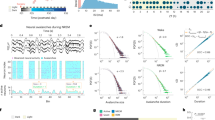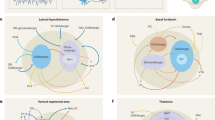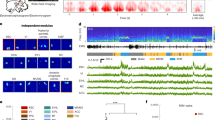Abstract
Sleep enhances plasticity in neocortex, and thereby improves sensory learning1. Here we show that sleep itself undergoes changes as a consequence of waking experience during a late critical period in cats and mice. Dark-rearing produced a robust and reversible decrement of slow-wave electrical activity during sleep that was restricted to visual cortex and impaired by gene-targeted reduction of NMDA receptor function.
This is a preview of subscription content, access via your institution
Access options
Subscribe to this journal
Receive 12 print issues and online access
$209.00 per year
only $17.42 per issue
Buy this article
- Purchase on Springer Link
- Instant access to full article PDF
Prices may be subject to local taxes which are calculated during checkout



Similar content being viewed by others
References
Stickgold, R., Hobson, J.A., Fosse, R. & Fosse, M. Science 294, 1052–1057 (2001).
Steriade, M., McCormick, D.A. & Sejnowski, T.J. Science 262, 679–685 (1993).
Mednick, S.C. et al. Nat. Neurosci. 5, 677–681 (2002).
Daw, N. Visual Development (Plenum, New York, 1995).
Crair, M.C., Gillespie, D.C. & Stryker, M.P. Science 279, 566–570 (1998).
Frank, M.G., Issa, N.P. & Stryker, M.P. Neuron 30, 275–287 (2001).
Jouvet-Mounier, D., Astic, L. & Lacote, D. Dev. Psychobiol. 2, 216–239 (1970).
Gordon, J.A. & Stryker, M.P. J. Neurosci. 16, 3274–3286 (1996).
Mower, G.D., Caplan, C.J., Christen, W.G. & Duffy, F.H. J. Comp. Neurol. 235, 448–466 (1985).
Steigerwald, F. et al. J. Neurosci. 20, 4573–4581 (2000).
Fagiolini, M. et al. Proc. Natl. Acad. Sci. USA 100, 2854–2859 (2003).
Kiyama, Y. et al. J. Neurosci. 18, 6704–6712 (1998).
Ito, I., Sakimura, K., Mishina, M. & Sugiyama, H. Neurosci. Lett. 203, 69–71 (1996).
Kattler, H., Dijk, D.J. & Borbely, A.A. J. Sleep Res. 3, 159–164 (1994).
Vyazovskiy, V., Borbely, A.A. & Tobler, I. J. Sleep Res. 9, 367–371 (2000).
Acknowledgements
We thank H. Mori and M. Mishina (Univ. Tokyo) for kindly providing NR2A KO mice, S. Fujishima for animal care, and M. Fagiolini for inspirational comments.
Author information
Authors and Affiliations
Corresponding author
Rights and permissions
About this article
Cite this article
Miyamoto, H., Katagiri, H. & Hensch, T. Experience-dependent slow-wave sleep development. Nat Neurosci 6, 553–554 (2003). https://doi.org/10.1038/nn1064
Received:
Accepted:
Published:
Issue Date:
DOI: https://doi.org/10.1038/nn1064
This article is cited by
-
The Ontogenesis of Mammalian Sleep: Form and Function
Current Sleep Medicine Reports (2020)
-
Genetic etiologies of the electrical status epilepticus during slow wave sleep: systematic review
BMC Genetics (2018)
-
New Genes for Focal Epilepsies with Speech and Language Disorders
Current Neurology and Neuroscience Reports (2015)
-
Sleep and the single neuron: the role of global slow oscillations in individual cell rest
Nature Reviews Neuroscience (2013)
-
GRIN2A mutations in acquired epileptic aphasia and related childhood focal epilepsies and encephalopathies with speech and language dysfunction
Nature Genetics (2013)



